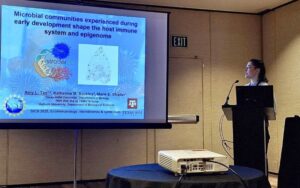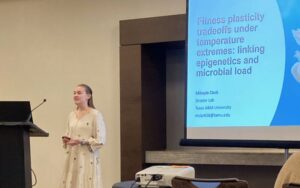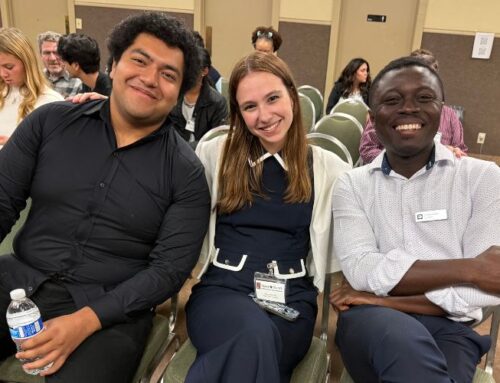Strader Lab Presents at SICB
By: TAMU Biology
The Strader Lab at Texas A&M University presented their new cutting-edge research at the Society for Integrative and Comparative Biology (SICB) Conference in Atlanta, GA, in January 2025, focusing on the impacts of environmental change on marine organisms. Their presentations explored the complex relationships between temperature, microbial exposure, and the physiological and molecular traits of marine species, offering new insights into how these organisms may adapt to rapidly shifting ecosystems.
 “Microbial Communities Experienced During Early Development Shape the Host Immune System and Epigenome”
“Microbial Communities Experienced During Early Development Shape the Host Immune System and Epigenome”
Presenter: Amy Tan, Texas A&M University, Department of Biology
The first presentation, led by Tan, a postdoc in the Strader lab, examines how early developmental exposure to high temperatures and host-associated microbial communities impacts the immune function and epigenome of the purple sea urchin (Strongylocentrotus purpuratus). By rearing embryos in varied conditions—ambient or elevated temperatures (14ºC or 18ºC) and either sterilized or microbiome-exposed sea water—researchers uncovered significant differences in larval morphology, immune cell development, and chromatin modifications. The findings suggest that microbial exposure during early development plays a crucial role in shaping the immune system and the epigenome of marine organisms, revealing potential pathways for adaptation in the face of environmental change.
 “Fitness Plasticity Tradeoffs Under Temperature Extremes: Linking Epigenetics and Microbial Load”
“Fitness Plasticity Tradeoffs Under Temperature Extremes: Linking Epigenetics and Microbial Load”
Presenter: Mikayla Clark, Texas A&M University, Department of Biology
The second study, presented by Clark, a Bio PhD student in the Strader lab, investigates the remarkable phenotypic plasticity of the tropical jellyfish species Cassiopea spp. under varying temperatures and microbial conditions. The research explores how polyps of Cassiopea adjust their reproductive strategies in response to environmental stressors, such as heat and microbial load. By linking changes in epigenetic markers to shifts in organismal fitness, this work offers new insights into how marine organisms balance growth and reproduction in the face of changing environmental conditions.
“Genetic and Physiological Mechanisms Driving the Northern Range Expansion of a Tropical Jellyfish”
Presenter: Marie Strader, Texas A&M University, Department of Biology
The final presentation focused on characterizing the northward range expansion of the tropical jellyfish Cassiopea xamachana. This research, conducted by Strader and her team, combines community science data with genetic and physiological analysis to uncover the mechanisms behind the species’ ability to thrive in cooler, temperate environments. By profiling morphological changes and assessing thermal tolerance limits, the researchers provide new insights into how species adapt genetically and physiologically to novel environments. This study contributes to the growing body of knowledge on how marine species respond to climate change and expand their geographic ranges.
These presentations highlight the Strader Lab’s commitment to understanding the effects of global environmental change on marine organisms and their capacity to adapt. The research also provides a deeper understanding of the molecular and physiological mechanisms at play, which is crucial for predicting the future resilience of marine species in a rapidly warming world.
For more information or media inquiries, please contact:
Marie Strader, Ph.D.
Principal Investigator, Strader Lab
Department of Biology, Texas A&M University
Email: mstrader@tamu.edu





